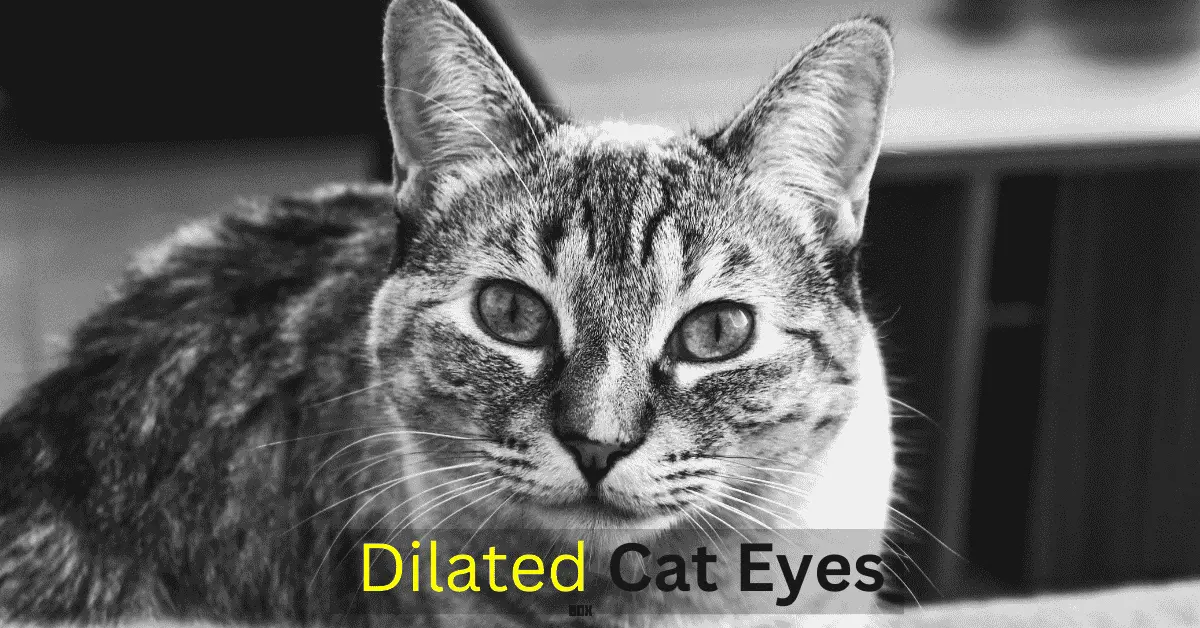If you’ve ever noticed your cat’s eyes appear larger than normal, you might have seen dilated pupils. This phenomenon can be caused by several factors, including light, emotions, and even health issues. As a pet owner, understanding why your cat’s pupils are dilated is important for identifying potential problems early.
In this guide, we’ll explore the causes of dilated cat eyes, the signs to watch out for, and when to seek veterinary care.
Table of Contents
ToggleWhy Are My Cat’s Eyes Dilated?
Dilated pupils in cats are a common reaction to various stimuli. Here are some of the most common reasons for pupil dilation:
-
Emotions: Excitement, fear, or arousal can cause cats’ pupils to dilate. This is often a normal response when cats are stimulated, whether they are playing, hunting, or feeling stressed.
-
Low Light Conditions: Cats have a unique ability to see in low light. Their pupils dilate to allow more light into their eyes in dark environments, improving their vision in such conditions.
-
Health Issues: Persistent pupil dilation can be a sign of an underlying health condition, such as glaucoma, high blood pressure, or chronic kidney disease.
If your cat’s pupils remain dilated for an extended period or don’t respond to changes in light, it may indicate a health issue that needs attention from a veterinarian.
What Causes Dilated Cat Eyes?
Dilated cat eyes can be caused by a variety of factors. Let’s dive into some of the most common ones:
-
Emotional Triggers: Excitement, fear, and playfulness are strong emotional triggers for pupil dilation. Whether your cat is about to pounce, startled by a loud noise, or experiencing a burst of stimulation, these emotions can lead to dilated pupils.
-
Health Conditions: Glaucoma, uveitis, progressive retinal atrophy, and hypertension can cause prolonged pupil dilation. If left untreated, these conditions can lead to vision loss and other serious health issues.
-
Medications and Toxins: Some medications or exposure to toxins (like catnip or certain drugs) may cause pupil dilation. If your cat has ingested a harmful substance or is on medication, this might affect their eyes.
-
Physical Injuries: Trauma to the head, retina, or ocular muscles can cause dilated pupils, especially if there’s damage to the optic nerve.
Normal Cat Pupils: How Do They Work?
Under normal conditions, a cat’s pupils adjust to light levels, becoming smaller in bright environments and larger in low light. The pupil is a black circle at the center of the iris, which controls the amount of light entering the eye. This adjustment is a crucial function of the autonomic nervous system and is key for their vision in different lighting conditions.
Cat Eye Dilation: What Does It Look Like?
When pupils dilate, they become round and large. A relaxed cat typically has vertical slit-shaped pupils, but in response to various stimuli (like low light, fear, or excitement), these pupils become round and large. If the pupils remain dilated despite changes in light, it may signal an issue that requires veterinary attention.
Response to Low Light: How Light Affects Cat Pupils
One of the most common reasons for pupil dilation is low light. Unlike humans, cats have excellent night vision, and their pupils dilate in response to darker environments. This allows them to see better in the dark, enhancing their ability to hunt or navigate their surroundings.
Excitement and Fear: Emotional Triggers for Dilated Pupils
Both excitement and fear can trigger pupil dilation. When cats are excited, their bodies release adrenaline, which causes the pupils to dilate. Similarly, in situations of stress or fear, the fight-or-flight response can cause the pupils to widen. This is a normal physiological response that prepares them for action.
Pain and Discomfort: Effects on Cat Pupils
When cats experience pain or discomfort, their pupils may dilate as well. This could be due to physical pain, injury, or illness. If your cat exhibits other signs such as vocalizing, hiding, or lethargy, and their pupils remain dilated, it’s important to consult a vet to rule out any serious health issues.
Catnip and Other Triggers for Dilated Pupils
Certain stimuli, such as catnip (which contains nepetalactone) or toys like laser pointers, can cause temporary pupil dilation. These triggers excite your cat, leading to a brief, natural reaction in their eyes.
Toxins and Medication: How They Impact Cat Pupils
Exposure to certain toxins or medications can also cause pupils to dilate. Cats who ingest harmful substances, such as plants or chemicals, may develop dilated pupils. Some medications prescribed by veterinarians, such as those used to treat eye conditions, can also cause temporary dilation.
Medical Conditions That Cause Dilated Pupils in Cats
Persistent pupil dilation can indicate underlying health conditions, such as:
-
Hypertension
-
Kidney disease
-
Hyperthyroidism
-
Retinal diseases like uveitis or progressive retinal atrophy
If your cat’s pupils remain dilated without a response to light, it’s essential to visit a veterinarian for a thorough examination and testing.
When To Seek Veterinary Care for Dilated Cat Eyes
If your cat shows signs of persistent pupil dilation, pain, loss of appetite, or behavioral changes, it’s time to schedule a visit with your vet. The veterinarian will perform a detailed ophthalmic exam and possibly recommend blood tests, ultrasound, or a CT scan to assess your cat’s eye health.
What Will Happen At The Vet: Eye Exams and Diagnosis
At the vet’s office, your cat will undergo a thorough physical exam, including an ophthalmic exam. This may involve:
-
Tonometry (measuring eye pressure)
-
Retina and optic nerve exam
-
Diagnostic imaging (such as ultrasound or a CT scan)
These tests help the veterinarian diagnose underlying conditions like glaucoma or brain tumors.
Diagnosing and Treating Abnormal Eye Dilation in Cats
Treatment for dilated pupils depends on the underlying cause. If the dilation is due to glaucoma, hypertension, or an eye disorder, your vet may recommend medication, eye drops, or lifestyle changes. Early diagnosis and treatment are crucial to prevent vision loss.
Vision Loss in Cats: Signs and Symptoms
Vision loss in cats may be linked to dilated pupils. Signs of vision loss include hesitation to jump, difficulty navigating obstacles, or squinting. If your cat is exhibiting these signs, it’s important to seek immediate veterinary care.
How To Help A Blind Cat: Tips for Caring for Vision-Impaired Cats
If your cat becomes blind, there are ways you can help them adjust. Providing a safe, consistent environment with familiar scents and sounds will aid their mobility. You can also use food and toys to guide them around.
Key Takeaways on Dilated Cat Eyes:
-
Dilated pupils are often a normal response to light, emotions, or excitement. Persistent pupil dilation could indicate underlying health conditions such as glaucoma, hypertension, or kidney disease. Regular veterinary care and early diagnosis are crucial for maintaining your cat’s eye health and overall well-being.
Final Note on Dilated Cat Eyes: Understanding the Causes and Care
Dilated cat eyes are not always a cause for concern. However, when accompanied by other symptoms, it’s important to seek veterinary care. Understanding the causes and knowing when to seek treatment will help ensure your cat’s eye health and overall well-being.
FAQs:
What does it mean when a cat’s eyes are dilated?
Dilated cat eyes can be caused by light, excitement, fear, or health issues like glaucoma or hypertension.
Do cats’ eyes dilate when they love you?
Yes, cats’ pupils can dilate when they feel comfortable and affectionate, but excessive dilation may indicate health problems.
When to worry about dilated pupils?
If your cat’s pupils remain dilated without responding to light, or if there are other signs like lethargy, it’s time to visit a vet.
Do cats’ pupils dilate when sick?
Yes, cats’ pupils may dilate when they are sick, especially with conditions like glaucoma or kidney disease. If other symptoms are present, consult a vet.
Related Article:
For more on cat behavior, check out our article on How to Stop Your Cat from Biting for additional helpful tips on managing common cat issues.




